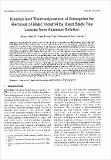Kinetics and thermodynamics of adsorption for removal of basis violet 14 by used black tea leaves from acqueous solution
Abstract
Most of dyes are synthetic chemical compounds having complex aromatic structures, which make them more stable and difficult to biodegradable. Dyes are extensively used to color the products in the textile, cosmetic, plastic, food, and pharmaceutical industries. The major problem in the recent years concerning in the dyes and textile industries waste waters contains colored effluent. Basic violet 14 (BV-14) is one of the common pollutants in industrial waste waters. This study involves the evaluation of kinetics and mechanism of adsorption for the remediation of BV-14 from aqueous solution by used black tea leaves (UBTL) as a low cost adsorbent. The concentration of BV-14 in aqueous solution was analyzed using UV-visible spectrophotometer. The effect of initial dye concentration, contact time, solution pH and temperature on the adsorption kinetics was investigated in batch process. Kinetic parameters and related correlation coefficients for simple firstorder, secondorder and pseudo second-order kinetic models were calculated and discussed. The results revealed that the adsorption kinetics was in good agreement with the pseudo second-order equation. The rate constant, equilibrium amount adsorbed and equilibrium concentration were calculated from pseudo second order kinetic plots for different initial concentrations. The equilibrium amount adsorbed obtained from pseudo second order kinetic plots for different temperatures were found to decrease with increase in temperature
i.e. the process is exothermic. Thermodynamic parameters such as the change of enthalpy {llHads), free energy {llGads) and entropy (llSads) were calculated from the equilibrium adsorption constant, and the adsorption of BV-14 on UBTL at pH6.0 was found to be spontaneous and exothermic in nature. Again the calculated values of equilibrium amount adsorbed from pseudo second order kinetic plots were found to be increased with increase of solution pH from 4.0 to
6.0 and then decreases with the increase of solution pH6.0 to 8.0. This observation might be due to the amphoteric nature of Basic violet 14 and zero point charge pH of UBTL (PHzpc=4.2).
Collections
- Bangladeshi Journal [94]

